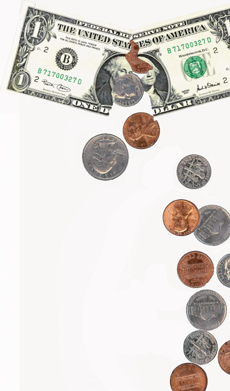 Mike Brennan
Mike Brennan Mike Brennan
Mike BrennanTax season is upon us, and many students are wondering where their hard-earned money has gone.
Students should know how to balance a budget, start a savings plan and understand the tax process.
The Budget
People lead different lifestyles, and personalized budget plans help allocate money for individual needs. It is best to put a budget on paper or a computer database to track where money is going.
Budget plans require constant adjustments, according to Linda Marquis, department of accountancy chair.
“If you budget to spend $100 on car repairs and $150 on clothes, recognize that these amounts are not equally manageable.
“If you have to spend $175 to get the car repaired, then perhaps you will need to adjust the amount you have planned to spend on clothes.”
Marquis suggests using a software package to track your spending.
Or use the “envelope method,” where you place the budgeted amount into its designated envelope each pay period.
Saving Money
“The worst way to save money is to have your employer withhold more money for taxes than is necessary,” Marquis said.
Although you will have a bigger income tax refund, you have also given the government an interest-free loan for a year.
It is better to have your employer directly deposit a designated sum into your savings account because you will then receive all of the interest earned.
The secret to saving money is to automatically place a portion of your income into a hard-to-access place or account.
Try to carry less cash and leave credit and debit cards at home, as well.
Now is a good time to open a savings account. The amount saved could eventually become a down payment on a new car or home.
“Students should establish an ongoing savings plan. I know it is difficult for them to save, but a few dollars of savings per week will accumulate to a nice sum of money down the road,” said finance lecturer Steve Devoto.
“All students should have an understanding of their marginal tax bracket, and how savings through qualified plans, such as IRAs and Employer Pension Plans, have a major impact on the growth of their savings account,” he said.
The Tax Process
Although the tax process is tedious, it is best to start now and file your taxes early.
After all, waiting until the last minute only prolongs the agony.
The tax return preparation process can be started as soon as you have accumulated the necessary information, according to Marquis.
The faster you file your taxes, the faster you will receive your refund.
While many wait until they receive their W-2 forms to begin filing taxes, you can begin the process with your last pay stub of the year, Marquis said.
“Don’t procrastinate, it is more difficult and expensive to get help at the last minute,” she said.
Be sure to review your W-4s to determine how much is being withheld from your pay check said Devoto.
Traditional students (with little income, no dependents, and no itemized deductions) should be able to fill out the EZ version of the tax forms with no professional help, Marquis said.
For students with more complicated returns, Marquis recommends purchasing tax software or hiring a Certified Public Accountant.
An advantage of filing your own taxes is that you understand the flow of the return and how it all ties together.
Tax planning should be continuous throughout the year, however. Check your pay stubs for your withholdings.
“Personal decisions are not always made based on the tax implications, but you should know what will be the tax impact of your decisions,” Marquis said.
Getting Help
NKU offers classes to assist students in making wise financial decisions, now and in the future.
Personal Finance Planning (FIN 205) teaches useful life skills, including checking and savings accounts, retirement planning, insurance awareness, and stocks and bonds expertise.
BUS 230, Legal Environment of Business, exposes students to legal concepts, including contracts, product and property law, and employment law.
And don’t forget, taxes are due April 15!

